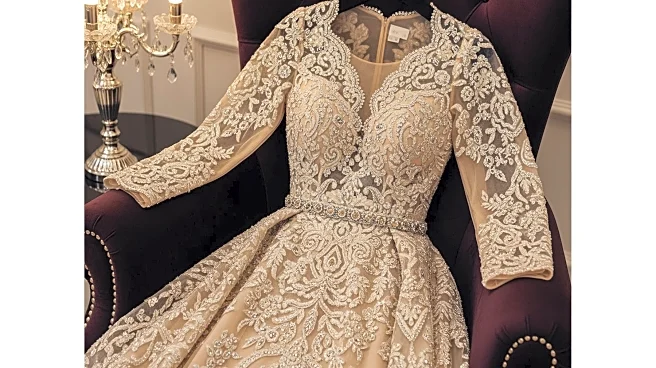What's Happening?
Rachel Griffin-Accurso, known as Ms. Rachel, attended the Glamour Women of the Year Awards 2025 in New York City wearing a gown embroidered with artwork by children from Gaza. The custom dress, designed by Risa Kostis, featured colorful drawings of doves
and landscapes, created by children named Ahmed, Luna, and Rama, among others. Griffin-Accurso highlighted the children's stories and expressed pride in showcasing their artwork. The event celebrated women from various fields, including culture, politics, and sports, with Griffin-Accurso recognized for her contributions as an early childhood educator and YouTube creator.
Why It's Important?
Ms. Rachel's choice to wear a gown featuring artwork from Gaza children brings attention to the humanitarian situation in the region, highlighting the resilience and creativity of young artists amidst challenging circumstances. By honoring these children at a high-profile event, Griffin-Accurso uses her platform to advocate for awareness and empathy, fostering a connection between diverse cultures. This gesture underscores the role of art in bridging gaps and promoting understanding, while also emphasizing the importance of supporting vulnerable communities.
What's Next?
Griffin-Accurso's public acknowledgment of Gaza children's artwork may inspire further initiatives to support and showcase art from conflict-affected regions. Her advocacy could lead to collaborations with organizations focused on humanitarian aid and cultural exchange, amplifying the voices of young artists globally. As an influential figure in early childhood education, Griffin-Accurso's actions may encourage others in her field to integrate cultural awareness and empathy into educational practices, fostering a more inclusive and compassionate learning environment.
Beyond the Headlines
The inclusion of Gaza children's artwork in a prestigious event highlights the power of art as a tool for social change and cultural diplomacy. It raises ethical considerations about the representation of marginalized communities in mainstream media and the responsibility of public figures to advocate for global issues. Griffin-Accurso's gesture may prompt discussions on the role of celebrities in humanitarian efforts and the impact of cultural initiatives on public perception and policy.
















